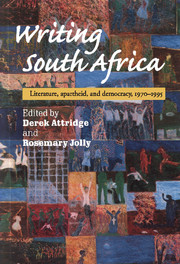Book contents
- Frontmatter
- Contents
- Contributors
- Acknowledgements and note on references
- South Africa, 1930–1996: a chronology
- Maps
- 1 Introduction
- 2 Interrogating silence: new possibilities faced by South African literature
- 3 I am dead: you cannot read: André Brink's On the Contrary
- 4 Endings and new beginning: South African fiction in transition
- 5 The post-apartheid sublime: rediscovering the extraordinary
- 6 Postmodernism and black writing in South Africa
- 7 Shame and identity: the case of the coloured in South Africa
- 8 A man's world: South African gay writing and the State of Emergency
- 9 The final safari: on nature, myth, and the literature of the Emergency
- 10 Interview
- 11 Speech and silence in the fictions of J.M.Coetzee
- 12 ‘Dialogue’ and ‘fulfilment’ in J.M. Coetzee's Age of Iron
- 13 Interview
- 14 Inside out: Jeremy Cronin's lyrical politics
- 15 Spinning out the present: narrative, gender, and the politics of South African theatre
- 16 South African theatre in the United States: the allure of the familiar and of the exotic
- Position papers
- Select bibliography: South African literary writing in English, 1970–1995
- Index
1 - Introduction
Published online by Cambridge University Press: 05 July 2011
- Frontmatter
- Contents
- Contributors
- Acknowledgements and note on references
- South Africa, 1930–1996: a chronology
- Maps
- 1 Introduction
- 2 Interrogating silence: new possibilities faced by South African literature
- 3 I am dead: you cannot read: André Brink's On the Contrary
- 4 Endings and new beginning: South African fiction in transition
- 5 The post-apartheid sublime: rediscovering the extraordinary
- 6 Postmodernism and black writing in South Africa
- 7 Shame and identity: the case of the coloured in South Africa
- 8 A man's world: South African gay writing and the State of Emergency
- 9 The final safari: on nature, myth, and the literature of the Emergency
- 10 Interview
- 11 Speech and silence in the fictions of J.M.Coetzee
- 12 ‘Dialogue’ and ‘fulfilment’ in J.M. Coetzee's Age of Iron
- 13 Interview
- 14 Inside out: Jeremy Cronin's lyrical politics
- 15 Spinning out the present: narrative, gender, and the politics of South African theatre
- 16 South African theatre in the United States: the allure of the familiar and of the exotic
- Position papers
- Select bibliography: South African literary writing in English, 1970–1995
- Index
Summary
In declining our invitation to contribute an article to this volume, Breyten Breytenbach wished us well but pointed out the impossibility of our task. How can we begin to assess the issues raised by literature written in South Africa from 1970 to 1995, considering our closeness to the event?
Produced during a period of intense political struggle, the literature of the period offers an opportunity to examine a set of complex questions whose importance goes well beyond the boundaries of a single country. Does literature have a distinctive role to play in political life? What is the writer's responsibility in a situation of political crisis? How does the writer's concern with form and language relate to the demands of ethics and politics? How are ethical priorities changing in relation to political developments, and how are these changes suggested or reflected in cultural practices? How do issues of class and gender interact with those of race in an environment that is marked by rapid political shifts?
Such issues inform a further set of questions about the specificity of South African literary traditions. How do these traditions draw on or set themselves against literary developments in the rest of Africa, and in Europe and the Americas? How useful are the terms ‘modernism’, ‘post modernism,’ ‘postcolonialism’, in the description of South African literatures?
- Type
- Chapter
- Information
- Writing South AfricaLiterature, Apartheid, and Democracy, 1970–1995, pp. 1 - 13Publisher: Cambridge University PressPrint publication year: 1998
- 2
- Cited by



